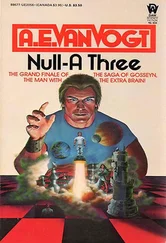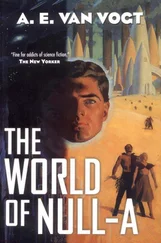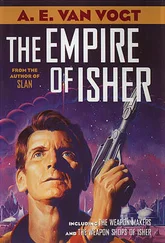Alfred van Vogt - The Players of Null-A
Здесь есть возможность читать онлайн «Alfred van Vogt - The Players of Null-A» весь текст электронной книги совершенно бесплатно (целиком полную версию без сокращений). В некоторых случаях можно слушать аудио, скачать через торрент в формате fb2 и присутствует краткое содержание. Жанр: Фантастика и фэнтези, на английском языке. Описание произведения, (предисловие) а так же отзывы посетителей доступны на портале библиотеки ЛибКат.
- Название:The Players of Null-A
- Автор:
- Жанр:
- Год:неизвестен
- ISBN:нет данных
- Рейтинг книги:3 / 5. Голосов: 1
-
Избранное:Добавить в избранное
- Отзывы:
-
Ваша оценка:
- 60
- 1
- 2
- 3
- 4
- 5
The Players of Null-A: краткое содержание, описание и аннотация
Предлагаем к чтению аннотацию, описание, краткое содержание или предисловие (зависит от того, что написал сам автор книги «The Players of Null-A»). Если вы не нашли необходимую информацию о книге — напишите в комментариях, мы постараемся отыскать её.
The Players of Null-A — читать онлайн бесплатно полную книгу (весь текст) целиком
Ниже представлен текст книги, разбитый по страницам. Система сохранения места последней прочитанной страницы, позволяет с удобством читать онлайн бесплатно книгу «The Players of Null-A», без необходимости каждый раз заново искать на чём Вы остановились. Поставьте закладку, и сможете в любой момент перейти на страницу, на которой закончили чтение.
Интервал:
Закладка:
That meant he must, literally, rebuild his defenses every morning and evening in overlapping series, so that he'd never be caught without a few key points to which he could escape in an emergency. There were several puzzling aspects to the time limits involved. But that was something to investigate when he got to Venus.
As he stepped into the elevator a moment later, he glanced at his watch. 9:27.
One minute later, at 9:28, the time for which the accident was scheduled, the elevator crashed to destruction at the bottom of its shaft.
II
NULL-ABSTRACTS
General Semantics enables the individual to make the following adjustments to life: (1) He can logically anticipate the future. (2) He can achieve according to his capabilities. (3) His behavior is suited to his environment.
Gosseyn arrived at the mountain take-off point a few minutes before eleven o'clock. The air at this height was briskly cool, and the effect was of exhilaration. He stood for a while near the high fence beyond which the spaceship lay on its cradle. The first step, he thought, was to get through the fence.
That was basically easy. The area swarmed with people, and one more, once he got inside, would scarcely be noticed. The problem was to get in without anyone observing him materialize.
He felt no regrets, now that he had made up his mind. The slight delay caused by the accident—he'd escaped from the elevator by the simple process of similarizing himself back into his hotel room—had brought a keen awareness of how little time remained to him. He had a picture of himself trying to obtain a certificate of admission from the Institute of Emigration at this final day. The visualization was all he needed. The time for legality was past.
He selected a spot on the other side of the fence behind some packing cases, memorized it, stepped behind a truck—and a moment later walked out from behind the packing cases and headed towards the ship. Nobody tried to stop him. Nobody gave him more than a passing glance. The fact that he was inside the fence was credential enough, apparently.
He walked aboard and spent his first ten minutes memorizing a dozen floor areas with his extra-brain—and that was that. During the take-off, he lay comfortably on the bed of one of the finest suites on the ship. About an hour later, a key rattled in the lock. Swiftly, Gosseyn attuned to a memorized area, and swiftly he was transported to it.
He'd chosen his materialization positions skillfully. The three men who saw him step out from behind a heavy girder obviously took it for granted that he had been there for several minutes, for they scarcely glanced at him. He walked easily to the rear of the ship, and stood before the great plexiglass port gazing down at Earth.
The planet was vast below him. It was an immense world that still showed color. As he watched, it slowly turned a grayish dark, and looked rounder every minute. It began to contract sharply, and for the first time he saw it as a great misty ball floating in black space.
Somehow it looked unreal.
He stayed that first night in one of the many unoccupied cabins. Sleep came slowly, for his thoughts were restless. Two weeks had passed since the death of the mighty Thorson, and he hadn't heard a word from Eldred Crang or Patricia Hardie. All his attempts to contact them through the Institute of Emigration had met with the unvarying reply, 'Our Venusian office reports your message undeliverable.’ He'd thought once or twice that Janasen, the Institute official, took a personal satisfaction in giving him the bad news, but that seemed hardly possible.
There was no question, so it seemed to Gosseyn, that Crang had seized control of the galactic army on the very day Thorson died. The papers'd been full of the news of the withdrawal of the invaders from the cities of non-Aristotelian Venus. There was confusion as to the reason for the mass retreat, and the editors did not seem to be clear as to what was happening. Only to him who knew what had preceded the enormous defeat was the situation understandable. Crang was in control. Crang was shipping the galactic soldiers out of the solar system as fast as his two-mile-long similarity powered ships could carry them—before Enro the Red, military overlord of the Greatest Empire, discovered that his invasion was being sabotaged.
But that didn't explain why Crang had not delegated someone to get in touch with Gilbert Gosseyn who, by killing Thorson, had made all this possible.
Gosseyn slept uneasily on that thought. For though the desperate danger of the invasion was temporarily averted, his own personal problem was unsolved—Gilbert Gosseyn, who possessed a trained extra brain, who had died, yet lived again in a highly similar body. His own purpose must be to find out about himself and his strange and tremendous method of immortality. Whatever the game that was being played around him, he seemed to be one of the important and powerful figures in it. He must have been tensed by the long strain he'd been under and by the hideous fight with Torson's armored guard, or he would have realized sooner that, like it or not, for better or for worse, he was above the law. He should never have wasted his time with the Institute of Emigration.
Nobody questioned him. When officers came towards him, he stepped out of sight, and vanished to one of his memorized areas. Three days and two nights after the start, the ship eased down through the misty skies of Venus. He had glimpses of colossal trees, and then a city grew onto the horizon. Gosseyn came down the gangplank with the rest of the four hundred passengers. From his place in the fast moving line he watched the process of landing. Each person stepped up to a lie detector, spoke into it, was confirmed, and passed through a turnstile into the main part of Immigration Hall.
The picture clear in his mind, Gosseyn memorized a spot behind a pillar beyond the turnstile. Then, as if he had forgotten something, he returned aboard the ship and hid until dark. When the shadows lay deep and long in the land below, he materialized behind the pillar of the immigration building, and walked calmly toward the nearest door. A moment later he stepped down onto a paved sidewalk, and looked along a street that shone with a million lights.
He had an acute sense of being at the beginning and not the end of his adventure—Gilbert Gosseyn, who knew just enough about himself to be dissatisfied.
The pit was guarded by a division of Venusian Null-As, but there was no interference with the thin but steady stream of visitors. Gosseyn wandered disconsolately along the brightly lighted corridors of the underground city. The vastness of what had once been the secret base in the solar system of the Greatest Empire overshadowed his body. Silent distorter-type elevators carried him to the higher levels, through rooms that glittered with machines, some of which were still operating. At intervals he paused to watch Venusian engineers singly and in groups examining instruments and mechanical devices.
A communicator snatched Gosseyn's attention, and a sudden wonder made him stop and switch it on. There was a pause, then the voice of the roboperator said in a matter-of-fact tone, ‘What star are you calling?'
Gosseyn drew a deep breath. 'I'd like,' he said, 'to speak to either Eldred Crang or Patricia Hardie.'
He waited, with rising excitement. The idea had come like a flash, and he could hardly imagine its being successful. But even if no contact was established, that in itself would be information of a sort.
After several seconds, the robot said, 'Eldred Crang left the following message: “To anyone who may attempt to locate me, I regret that no communication is possible".' That was all. There was no explanation. 'Any other call, sir?'
Читать дальшеИнтервал:
Закладка:
Похожие книги на «The Players of Null-A»
Представляем Вашему вниманию похожие книги на «The Players of Null-A» списком для выбора. Мы отобрали схожую по названию и смыслу литературу в надежде предоставить читателям больше вариантов отыскать новые, интересные, ещё непрочитанные произведения.
Обсуждение, отзывы о книге «The Players of Null-A» и просто собственные мнения читателей. Оставьте ваши комментарии, напишите, что Вы думаете о произведении, его смысле или главных героях. Укажите что конкретно понравилось, а что нет, и почему Вы так считаете.











